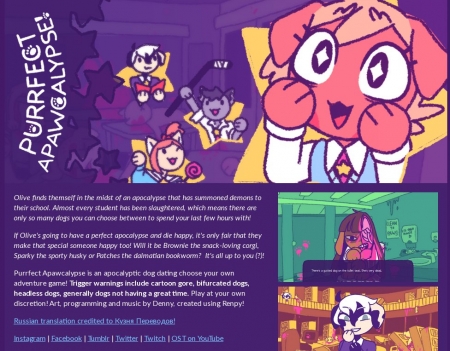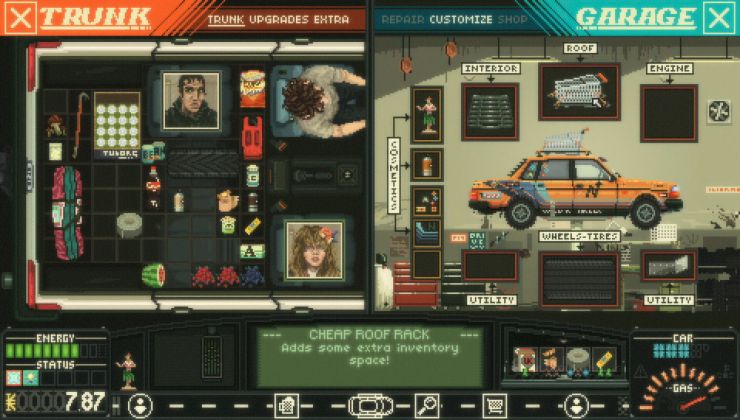The creator of indie store itch.io has issued a warning to game developers, as Chooseco appear to be trying to take down anything using the 'choose your own adventure' phrase.
Not surprising it's happening though, Chooseco went after Netflix for using the same phrase with Black Mirror: Bandersnatch. Speaking on Twitter, itch.io founder Leaf Corcoran stated:
Warning to any devs using the phrase "choose your own adventure" to describe their games, Chooseco is issuing takedown notices to @itchio for trademark infringement. Example game page they went after:
In a follow up Twitter post, Corcoran mentioned the person issuing the notices on behalf of Chooseco has been "difficult" and it comes across like they're essentially trolling. This is what happens though, often too, there's legal trolls everywhere. Some companies are set up just to go around sending off trademark notices on junk. I find it completely ridiculous that any company can trademark something like 'choose your own adventure', it just seems crazy to even allow that.
Regardless of how insane it is that such a thing can happen, game developers do need to come together and come up with something else they can use instead. Perhaps someone can then protect it themselves on the basis that anyone can use it, much in the spirit of open source eh? Can you think of a fun phrase that would fit? Let's see what you've got in the comments.
To be honest, this sounds like a fairly legitimate claim to me. The "Choose Your Own Adventure" series of books was pretty popular in the eighties, and everyone knew that the phrase referred to a very specific series of books. That phrase did not exist in English before those books came out. Some competitors released similar material, but they had to use a different name.
A big issue here is that it is not universally recognised as a brand name. As a Swede born in the late 80's, I had heard the phrase but only in reference to a style of story (aka, a genre), and it was not until my university years about a decade ago that an American student informed me there was an actual brand name behind the term.
I'm willing to bet you will even find many Americans born 80's and later that also recognise it as a genre rather than a brand name. Thus it might have made sense to give them the privilege of a trademark back in the 70's and 80's, but at this point it should be void.
--
On the more general topic though; the biggest problem with IP law, in my opinion, is that you are considered guilty until proven innocent. Put the burden of evidence on the claimant and the problem will probably go away on its own. There are problems with that as well, but then we are going into an area hard to debate in a comment section.
For trademarks, the key is that the trademark owner has to use the mark (in this case, Choose Your Own Adventure) in association with particular goods and services.
Chooseco does have a registered trademark and their description of goods does include video games: [Chooseco's mark](http://tsdr.uspto.gov/#caseNumber=78975496&caseType=SERIAL_NO&searchType=statusSearch)
Anybody that has a registered trademark risks losing their mark if they allow their mark to become generic. So, if you are a trademark owner, you do need to police your mark like this. So, this is not 'trolling' like you see with patent law. From a legal standpoint, what they're doing is exactly what they're supposed to do.
The US Patent and Trademark Office (USPTO) does a search when you apply for a trademark. If they don't find another registered mark (for the same goods or services) that would be confusing, they can allow the mark. But they generally do not do extensive searches outside of registered marks (that's left for the public to do when the mark is published, but most people don't monitor that).
Their mark was registered in 2003 (they might have earlier registrations, but I didn't check). So, a good question would be whether Choose Your Own Adventure was being used to describe video games by other people prior to 2003. Just because they had a Choose Your Own Adventure mark for books in the 80s, doesn't automatically give them the rights to the mark for video games.
Another question would be whether Chooseco is actually using their marks. A quick look at their registration and they include a whole bunch of things as the goods and services (movies, games, etc.). They did provide a 'specimen' as proof that they are using their mark, but the specimen appears to be a DVD movie. If they're not making video games, then their mark might not be valid (you should not be allowed to have a trademark if you are not actually 'using' it). But, Chooseco could argue that a movie that is interactive is a video game.
But, there really doesn't seem to be anything wrong with what is happening here. Chooseco isn't doing anything underhanded. And, in the big picture, it's not like they're doing anything particularly harmful. It's not much of a burden to describe the game as something else.
Their mark was registered in 2003 (they might have earlier registrations, but I didn't check). So, a good question would be whether Choose Your Own Adventure was being used to describe video games by other people prior to 2003. Just because they had a Choose Your Own Adventure mark for books in the 80s, doesn't automatically give them the rights to the mark for video games.
One point here, Chooseco didn't exist in the 80s. The books at that time were published by Bantam Books, who would have held copyright and any trademarks that were registered on the line. Chooseco wasn't founded until 2003 as a vehicle for the author and his wife to re-publish the old books and create new material.
As mentioned earlier, they are notably litigious, suing Chrysler for an ad campaign whose tagline was "Choose Your Adventure" (noting they didn't even use the whole phrase) and Netflix over an interactive Black Mirror film.
Of course at the time it was basically an attempt to recreate some of the ideas behind paper and pencil roleplaying games, except as something you could do alone. It pretty much failed; even to this day, the most amazing computer game still can't be that much like having a real human game master. But I guess it was better than nothing.
Frankly, those books were a pretty lame gimmick anyway. Or rather . . . it was innovative, kind of, but the whole concept just didn't work well with print. You're looking at a small paperback to start with, and once you've not only divided it up into a bunch of branching storylines and included the directions and whitespace you need for it to be comprehensible, each "story" is bloody tiny. Plus you spend the whole time flipping back and forth. Works way better on computers, and I say that as a lover of print books.
Of course at the time it was basically an attempt to recreate some of the ideas behind paper and pencil roleplaying games, except as something you could do alone. It pretty much failed; even to this day, the most amazing computer game still can't be that much like having a real human game master. But I guess it was better than nothing.
I guess it depends on where you've been coming from. For me, young and with no idea something like pen & paper exists, it was pretty exciting!
Last edited by Eike on 15 Dec 2019 at 12:05 pm UTC
One point here, Chooseco didn't exist in the 80s. The books at that time were published by Bantam Books, who would have held copyright and any trademarks that were registered on the line. Chooseco wasn't founded until 2003 as a vehicle for the author and his wife to re-publish the old books and create new material.Thanks for clarifying that. I didn't look into it all that much.
There really is nothing wrong with someone else registering a mark after the original trademark owner abandons the mark. I think as others have mentioned earlier, the general theory behind trademarks is that it is meant to help people identify the source of the goods or services. So long as there is one 'source' then that's okay.
Of course, that ends up being sort of artificial because do consumers really go and check the trademark register before they buy something to know who the source is? Even product names that are well known have changes in ownership, changes in management, changes in employees, etc. so that even if the source of the products ends up being the same, the quality isn't always the same. Products end up changing quality (usually for the worse) but they still ride on using the well-known name of the product to push sales.
As mentioned earlier, they are notably litigious, suing Chrysler for an ad campaign whose tagline was "Choose Your Adventure" (noting they didn't even use the whole phrase) and Netflix over an interactive Black Mirror film.That would push them more to the scummy side of things. Like I said, they do need to protect their rights, and policing your trademark is part of that. How you choose to go about doing that adventure is another thing.
Last edited by ugly on 15 Dec 2019 at 5:25 pm UTC
As mentioned earlier, they are notably litigious, suing Chrysler for an ad campaign whose tagline was "Choose Your Adventure" (noting they didn't even use the whole phrase) and Netflix over an interactive Black Mirror film.That would push them more to the scummy side of things. Like I said, they do need to protect their rights, and policing your trademark is part of that. How you choose to go about doing that adventure is another thing.
I see what you did there :D








 How to set, change and reset your SteamOS / Steam Deck desktop sudo password
How to set, change and reset your SteamOS / Steam Deck desktop sudo password How to set up Decky Loader on Steam Deck / SteamOS for easy plugins
How to set up Decky Loader on Steam Deck / SteamOS for easy plugins
See more from me